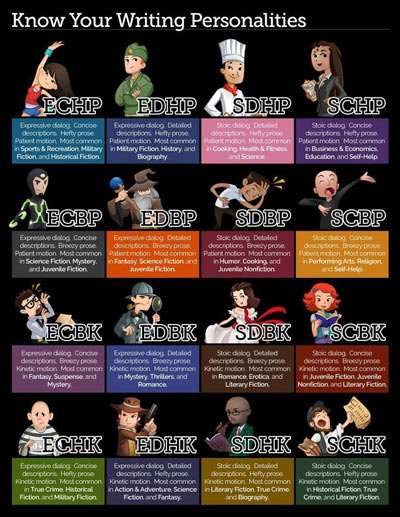Writers must know their writing personality. They must also discover, and write with, their unique voice. But, what about non-writers? Why would such things matter to them?
In short, because the “active literacies” of writing, argumentation, and public speaking enable you to write the script of your own life. And, at the core of their mastery is knowledge of writing personality and voice.
7 Great Reasons
- Write the main script of your own life, authentically, and in your own voice.
- Replace the scripts, given to you by others, in the Seven (irreducible) Matters of Life, with your own.
- “Get out of your head” by connecting your inner intellectual life with your outer reality.
- Help others by “giving voice” to their concerns. Influence them to take action on their own dear purposes or beliefs.
- Bypass the procrastination that comes from worrying that what you’ve written (or haven’t yet written) will “come off” as inauthentic.
- Recruit allies to your work, projects, interests, purposes, and calling.
- Write faster, better, and more effectively having removed these primary introspective blocks.
Ignorance of writing personality and voice are the primary introspective blocks to expression. With their removal the road to mastery of the active literacies is clear.
The Active Literacies
Any role requiring you to influence, share with, or teach others can be accomplished more effectively with mastery of what J.T. Gatto calls the “active literacies“.
America was literate beyond anybody’s wildest dreams, and not merely book-literate. Americans (Circa 1840) were broadly proficient in the formidable “active literacies” of writing, argumentation, and public speaking; things which had actually been a crime to teach ordinary people under British colonial rule.
— John Taylor Gatto, “Weapons of Mass Instruction”, pp. 17
John expands further in “The Ultimate History Lesson, a Weekend With John Taylor Gatto“.
We all are vaguely aware that literacy is at the heart of an intellectual inner life, but what we don’t understand is that is, prior to the First World War, literacy was commonly divided into passive literacy, reading, and active literacy, speaking and writing. And none of us are aware that in Colonial days, that to teach active literacy to ordinary people was a crime! Why? Because reading, you’re locked in your own head and you still have the benefit of being able to read the boss’s instructions about what to do. But if you can speak well, as our current President can, or write well, you can reach way beyond your own skull and recruit allies. That’s a no-no for ordinary people;, they’re supposed to be so inarticulate, or their writing will look so funny with ink blots and things in it, that no one treats them seriously.
Knowledge Workers
Knowledge workers are workers whose main capital is knowledge. Examples include software engineers, physicians, pharmacists, architects, engineers, scientists, public accountants, lawyers, and academics, whose job is to “think for a living”.1
As a consultant I know, firsthand, how knowledge workers must often become functional writers. They must excel at expressing the results of their work to merely deliver it. Aside from formal occupations, knowledge work is almost unavoidable, nowadays. If you spend three or more hours a day behind a computer, chances are good you also need to write, or talk about, what you’ve accomplished. Words fly faster, higher, and more effectively, when the writer is resonating with their own personality and voice.
Writing vs. Reading Personality
What you read is not necessarily how you’ll write. You might read science fiction, romance novels, how-to’s, or biographies. That doesn’t mean your writing personality will fit one of those styles.
Of course, everything you read informs your writing. But, don’t feel compelled to match the styles or personalities of what you read.
The Path of My Discovery
I found my writing personality and voice by:
- Writing (and singing) lyrics and songs. I find it easier to remember melodies than lyrics. When I can’t remember lyrics I make them up to fit the melody.
- Writing for over 10,000 hours. Non-writers don’t need to do this. More crucial, for me, was …
- Knowing what I wanted to write about. That’s something you can find out with relative ease. In the case of the knowledge worker, for example, the subjects are often given to you or dictated by the work. If you’re writing the script(s) of your life, however, this will take more introspection.
- Over-learning subjects that are important to me. Toward that end I’ve taken many writing courses. I enjoyed Stephen King’s “On Writing”, Julia Cameron’s “Artist Way”, and Jeff Goin’s “Intentional Blogging”.
People are Blind to Their Own Strengths
People are the first to recognize their own weaknesses and last to recognize their strengths. Writing personality and voice have positive and negative attributes. Your writing will only improve if you recognize both. StrengthsFinder 2.0 is a great way to get started on finding your strengths. I also recommend taking a Meyers Briggs personality test.
Amber Helt explains how to use the graphic featured in this article which came from the BookGeome Project in association with National Novel Writing Month.
The Five Blogging Personalities
These personality types are described more thoroughly on Jeff Goin’s blog:
- The Artist … writes and creates because they love beauty.
- A Prophet … tells us the hard truth about the world or themselves.
- The Journalist … asks questions, assimilates the answers, and shares it with others.
- The Professor … teaches by taking something complex and breaking it up into small, actionable steps.
- The Star … is someone readers want to be around or be like.
If you’re not sure what personality you gravitate towards try giving samples of your writing to a few people you trust. Ask them for the first three adjectives that come to mind when they read them. Then ask them if your writing matches your actual personality. What’s missing? What’s not missing and rings authentic to the real you?
Use Your Voice
Take away your voice and all that’s left are facts and data. Even formal expression is more interesting, and easier to digest, when presented in a unique voice.
- What makes your voice distinct from all others?
- What impression do you want to give your readers/listeners?
- Can you add a story (Or a joke) to illustrate the point?
- Can you tell a joke to lighten up the mood?
- Would a sarcastic comment get listeners to perk up?
- Would a self-effacing comment add humility to an impression of arrogance that you don’t feel?
The main acronym of the book S.H.A.P.E.: Finding and Fulfilling Your Unique Purpose is also great for discovering your writing and speaking voice:
- Spiritual Gifts
- Heart
- Abilities (Natural)
- Personality
- Experience
It’s Worth It
The deep introspection involved in the journey to find your voice is worth it. Everything you learn thickens the connection of your inner intellectual life with your outer reality. What slowly begins to emerge is the masterpiece only you can be.
- Davenport, Thomas H. (2005). Thinking For A Living: How to Get Better Performance and Results From Knowledge Workers. Boston: Harvard Business School Press. ISBN 1-59139-423-6. ↩




